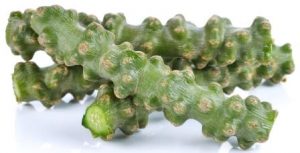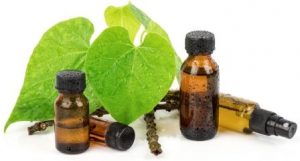Giloy is often referred to as the “root of immortality” in Ayurvedic medicine. There are many health benefits to this herb. It is an extreme antioxidant powerhouse, which prevents deadly diseases like cancer by fighting free radicals.
People have started using ayurvedic herbs more frequently since the onset of the common cold and flu. Giloy is a common ayurvedic herb used to boost immunity, which is our main concern right now.
Giloy enables the removal of toxins from the body, the purification of the blood, and the fighting off bacteria. People with liver disease are especially likely to benefit from it. An antipyretic remedy can help reduce fevers and ease symptoms of life-threatening fevers, such as those that are caused by dengue, swine flu, or malaria.
The Giloy tree belongs to the Tinospora cordifolia family and is called Guduchi in Hindi. Considering its high nutritional content and alkaloid content, the stem and root of Giloy are considered highly effective, but the leaves and roots are also effective.
In the Charak Samhita, Giloy is mentioned as one of the herbs that have a bitter taste. The remedy can be used to treat a variety of disorders as well as help alleviate Vata and Kapha dosha.
The heart-shaped leaves and reddish fruits of Giloy earn it the name Heart-leaved moonseed.
How does Giloy work as a medicine?

Giloy stems contain high amounts of nutrients and alkaloids, glycosides and steroids, but their roots and leaves should also be taken into consideration.
It has been proven that these compounds can be effective against numerous disorders, including diabetes, cancer, neurological problems, fevers, etc.
What is Giloy and how is it consumed?
Giloy has been prescribed in Ayurveda as either a powder or decoction (kadha) or even as a juice. There is also a powder and capsule form available nowadays. A paste-form of Giloy is also applied topically for skin problems.
Giloy is normally taken twice a day, one teaspoon at a time. Depending on what kind of health problem you have, the dose might differ.
What is the best way to prepare Giloy Juice?
The Giloy leaves have to be cleaned and chopped into pieces to make Giloy juice. The chopped branches should be blended with a cup of water into a fine, green liquid paste. Giloy juice is now ready by sieving this green paste.
Giloy provides numerous health benefits

Giloy is an anti-inflammatory and antipyretic (used to reduce fever), a strong immunity booster and antioxidant. All health anomalies can be cured by this classical medicine.
The Giloy treatment for chronic fever

In Ayurveda, there are two causes of fever: ama (toxins in the body, which are leftover from improper digestion), as well as foreign particles. When a fever is chronic and recurrent, Giloy works fantastically. As an antipyretic and anti-inflammatory herb, it helps boost your immune system to fight against infection as well as when you are recovering. Giloy can reduce fever through the Javarghana (antipyretic) effect.
The Giloy juice should be taken with 2-3 tablespoons of water and 2-3 teaspoons of Giloy juice. Make sure they are well mixed. Taking this mixture first thing in the morning should be the best choice.
Dengue fever treatment with Giloy
Antipyretic herbs such as Giloy are used in medicine. When dengue fever is treated with this medication, the platelet count increases and the risk of complications is reduced. Taking Giloy regularly during dengue season will improve your immunity and speed up your recovery. The best way to increase your platelet count is to boil Giloy juice with some Tulsi leaves and drink it.
It is used by extracting the juice of fresh stalks of Giloy mixed with 10 tulsi leaves and boiling them in 1/2 cup of water. Daily, drink it. Platelet production is increased by it.
Hay fever treatment with Giloy
A very good treatment for hay fever, or allergic rhinitis, is Giloy. There are benefits like a reduction in symptoms like runny nose, sneezing, nasal obstruction, and watery eyes. Taking 12 teaspoons of Giloy powder mixed with honey before a meal can help reduce your body’s temperature.
Use Giloy powder mixed with honey to reduce the body’s temperature. Eat this before eating to reduce the fever.
Keeps blood sugar at a healthy level

Ayurveda refers to Giloy as a “Madhunashini”, which means “destroyer of sugar.”. Control of blood sugar levels is ultimately achieved by enhancing insulin production. Giloy is used to treat diabetic complications such as kidney disease and ulcers.
Taking a half teaspoon of the Giloy powder after lunch and dinner twice a day with water is the recommended dose.
Boosts immunity

A person’s immune system is activated by this herb and their vitality increases because of it. Giloy juice or kadha can improve your immunity if you consume it twice a day. These are packed with antioxidants and help the body get rid of toxins. In addition, to detoxifying your skin, Giloy juice improves your complexion. In addition to liver diseases, Giloy is used for infections of the urinary tract and heart problems.
Giloy juice should be taken in doses of 2-3 teaspoons. It needs to be diluted with water in the same proportion. One or two times a day, consume it preferably before meals to enhance your immunity.
Digestive health
Giloy can reduce gastrointestinal problems like diarrhoea, colitis, vomiting, and hyperacidity. Giloy is taken twice a day after meals by mixing 12 teaspoons into 1 glass of lukewarm water.
Reduces anxiety and stress

Mental stress and anxiety can be reduced significantly with Giloy. You feel calmer after using it. Additionally, Giloy can enhance memory and cognitive abilities.
It is recommended to take Giloy Juice with 2-3 teaspoons of water. On an empty stomach, consume it once a day in the morning.
Gout and arthritis treatment
Gilbert has anti-inflammatory and anti-arthritic properties that can reduce the symptoms of arthritis and gout. Giloy powder is effective for treating joint pain.
Giloy powder should be consumed with warm milk to relieve joint pains.
Improves vision
Applying Giloy topically to the eye can significantly improve eye-sight. A Panchakarma treatment usually involves it.
A simple way to use Giloy powder is to boil it in water, then place it over your eyes after it has cooled.
Guduchi is a Dosha
The taste of Guduchi (Giloy) is bitter, astringent, and pungent. Guduchi can remove accumulated Pitta from the body as well as balance all the Doshas.
Giloy’s Negative Effects
It is safe for use, as the Giloy herb poses no side effects. Although Giloy is generally safe, it can cause low blood sugar levels when taken alongside other diabetic medications.
This may make autoimmune conditions such as rheumatoid arthritis worse since Giloy impairs the immune system. Lactating mothers do not experience any effects from it. In this case, it’s best to stay on the safe side and avoid Giloy during lactation.
Blood sugar levels may be affected by Giloy during or after surgery. To avoid Giloy before surgery, it is advised to do so at least 2 weeks before it takes place.
Throughout history, people have tried to make themselves healthy by utilizing the natural resources that nature provided. A combination of these natural resources is also known as Giloy. As a component of modern medicines, Giloy is not only used in ancient Ayurvedic medicine. Fever, increased digestibility, etc are some of the common uses. Among Giloy’s parts, the stem is the most useful. But the root is also useful. Its benefits have been studied since ancient times, so let us now consider how it benefits our health.
Note:
Articles such as this one are intended for educational purposes only. They are not intended as a substitute for medical care from a health care professional. Individual needs make it necessary for the reader to consult their physician to determine whether or not the information applies to them.


